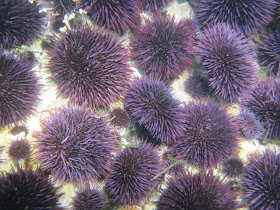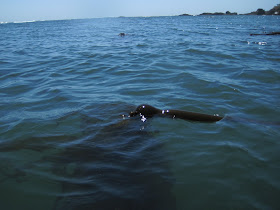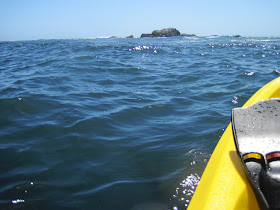



Art, Book reviews, Ceramics, Photographs, Postcards, Quick Fiction, Quotations, and (Usually Aquatic) Reflections. (P.S. This blog looks better in the web version.)






 A calmer shot: not very dramatic, but a lovely place to kayak. The underwater shots of sea urchins and anemones and the "weeds" above came from this pocket of water.
A calmer shot: not very dramatic, but a lovely place to kayak. The underwater shots of sea urchins and anemones and the "weeds" above came from this pocket of water. I'll admit freely that as I've approached fifty, and now turned fifty, I've been taking more self-portraits, trying to get some sense of what I really look like, what I really am like. (We all know the rose-colored or coal-colored glasses of personal melodrama and history.)
I'll admit freely that as I've approached fifty, and now turned fifty, I've been taking more self-portraits, trying to get some sense of what I really look like, what I really am like. (We all know the rose-colored or coal-colored glasses of personal melodrama and history.) 
 I look at these goofy shots and, mostly, chuckle. What vanity to think I'm going to learn anything about myself in such an exercise, and yet there I am, clicking away in front of a motel room mirror after a long day of sun and salt.
I look at these goofy shots and, mostly, chuckle. What vanity to think I'm going to learn anything about myself in such an exercise, and yet there I am, clicking away in front of a motel room mirror after a long day of sun and salt.  Is that my father I see in those features? Of course, but what about mom? Hugh, yes, but . . . George? And, how many selves could I have? Which one (or two) is really me? (I am a Gemini.)
Is that my father I see in those features? Of course, but what about mom? Hugh, yes, but . . . George? And, how many selves could I have? Which one (or two) is really me? (I am a Gemini.) There's something about the camera shot that I can stop and look at that differs from the mere mirror. I am not sure what that difference is, but discovering that is part of the exploration, perhaps even more than capturing these glimples of self.
There's something about the camera shot that I can stop and look at that differs from the mere mirror. I am not sure what that difference is, but discovering that is part of the exploration, perhaps even more than capturing these glimples of self.  Professional photographers will emphasize the need for that straight horizon, but I must say I prefer sea-shots that tilt. They seem truer to the experience, but then I'm a diver and kayaker more than a hiker or landscape painter on the shore.
Professional photographers will emphasize the need for that straight horizon, but I must say I prefer sea-shots that tilt. They seem truer to the experience, but then I'm a diver and kayaker more than a hiker or landscape painter on the shore. My quest over this summer will be to catch images that convey that sense of meaningful imbalance, that unfreighted lift of sea and sky. Somehow, I just haven't been able to translate via images those occasions when the whole world seems askew, seems tilting. Often, those heavy water sessions look tame to the camera, and there must be a way to figure that untamed feeling.
My quest over this summer will be to catch images that convey that sense of meaningful imbalance, that unfreighted lift of sea and sky. Somehow, I just haven't been able to translate via images those occasions when the whole world seems askew, seems tilting. Often, those heavy water sessions look tame to the camera, and there must be a way to figure that untamed feeling. In the next shot, you can see the wave approaching, but it felt a lot taller than it looks. There are also the matters of mass and speed. This was a fairly mild, though energetic day, so I didn't feel in danger, but I also knew I was a bit of cork bobbing amidst far greater forces. (But that's also why you go out there.)
In the next shot, you can see the wave approaching, but it felt a lot taller than it looks. There are also the matters of mass and speed. This was a fairly mild, though energetic day, so I didn't feel in danger, but I also knew I was a bit of cork bobbing amidst far greater forces. (But that's also why you go out there.) Perhaps in the close-up (after clicking on the shot), you can see the energy behind the texture. Kelp bobbing about, the waves were moving through; I felt like Sofia, my kayak, was half-horse in this session. More emphatically, the whole surface seemed (and seems) to loom over us.
Perhaps in the close-up (after clicking on the shot), you can see the energy behind the texture. Kelp bobbing about, the waves were moving through; I felt like Sofia, my kayak, was half-horse in this session. More emphatically, the whole surface seemed (and seems) to loom over us. When I first began thinking of this entry, I thought of the self-shots above as monkeying around, and then I thought of how much I've played with catching images while diving and kayaking for so many years.
When I first began thinking of this entry, I thought of the self-shots above as monkeying around, and then I thought of how much I've played with catching images while diving and kayaking for so many years.  My kayak Sofia is a very chatty boat. As she heads into any chop, she talks. I like that. I like how she talks to me, commenting on the conditions of swell and tide. As she moves through the water, particularly as she moves up and down, slapping and smacking, she talks and talks. I appreciate her voice and her beautiful shape in ways that other riders just wouldn't.
My kayak Sofia is a very chatty boat. As she heads into any chop, she talks. I like that. I like how she talks to me, commenting on the conditions of swell and tide. As she moves through the water, particularly as she moves up and down, slapping and smacking, she talks and talks. I appreciate her voice and her beautiful shape in ways that other riders just wouldn't. If you look up at her hull, you can see her "shoulders" or "hips". The full-bodied shape makes her very comfortable in rough water and reluctant to be rushed anywhere. (If my 180 pounds were in the kayak, you'd see how those shoulders and hips ride down in the water; hence, her deliberate pace as we move through the water.)
If you look up at her hull, you can see her "shoulders" or "hips". The full-bodied shape makes her very comfortable in rough water and reluctant to be rushed anywhere. (If my 180 pounds were in the kayak, you'd see how those shoulders and hips ride down in the water; hence, her deliberate pace as we move through the water.) You can see how she sits in the water here. Her "wings" are what give her that characteristic voice and way of riding and even sitting in the water. She's stable without being boring, and I can dive from her, sliding overboard to make my way underwater for a while, sliding back onboard, with a minimum of fuss and no anxiety or concern at all. With my fins on, I can practically vault onto her without any fear of upset.
You can see how she sits in the water here. Her "wings" are what give her that characteristic voice and way of riding and even sitting in the water. She's stable without being boring, and I can dive from her, sliding overboard to make my way underwater for a while, sliding back onboard, with a minimum of fuss and no anxiety or concern at all. With my fins on, I can practically vault onto her without any fear of upset.